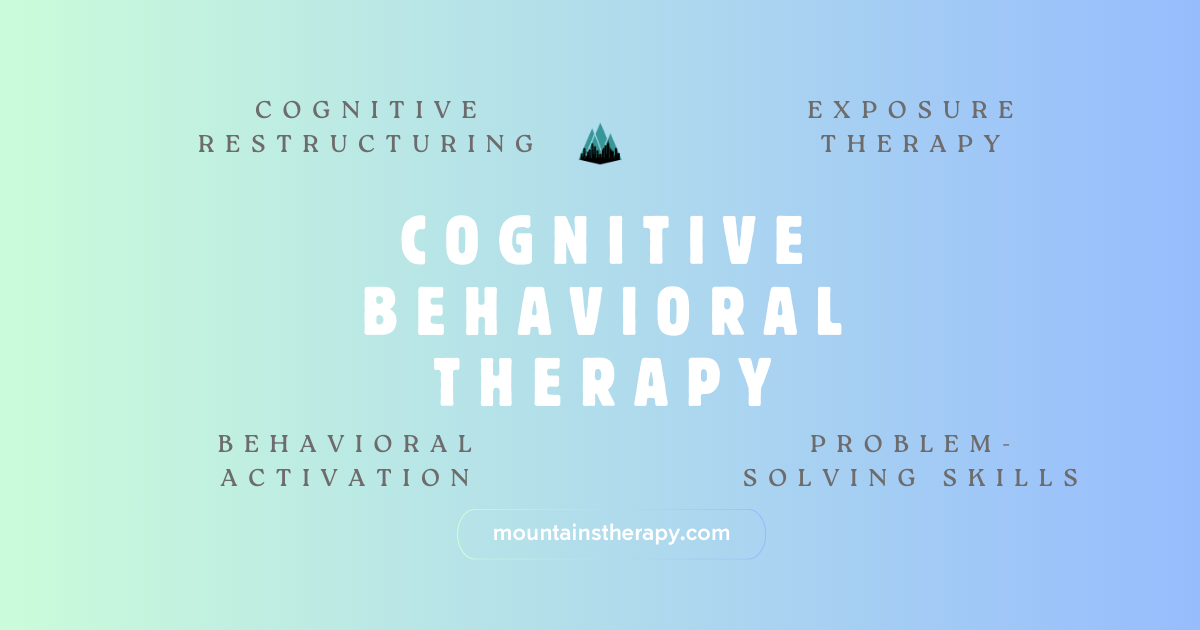Cognitive Behavioral Therapy (CBT) Exercises for Adults and Teens
Learn more about CBT therapy for Adults.
In This Blog, You’ll Learn:
- What Cognitive Behavioral Therapy (CBT) is and how it helps adults and teens.
- Effective CBT exercises to reframe negative thoughts and manage emotions.
- Practical strategies for overcoming anxiety, depression, and stress.
- How behavioral activation and mindfulness techniques improve well-being.
- The benefits of setting SMART goals to track mental health progress.
- How Mountains Therapy provides specialized CBT for adults and teens.
What is Cognitive Behavioral Therapy (CBT)?
Cognitive Behavioral Therapy (CBT) is a highly effective therapeutic approach used to help individuals—both adults and teens—identify and modify unhelpful thoughts and behaviors. At Mountains Therapy, we offer specialized CBT for adults and teens 15 and up, helping them manage anxiety, depression, stress, and other mental health challenges. By learning key CBT treatment interventions, and CBT techniques individuals can gain practical tools to improve their emotional well-being and lead more fulfilling lives. Here, we’ll explore some powerful interventions for Cognitive Behavioral Therapy that adults and teens can benefit from in therapy. So if you're looking for CBT therapy near me you're at the right place. So, what are cognitive interventions and how do they help?
Cognitive Behavioral Therapy Exercises
1. Identifying and Reframing Negative Thoughts
One of the core aspects of CBT is learning to recognize negative or distorted thoughts that can contribute to feelings of anxiety, depression, or low self-esteem. Both adults and teens often experience negative self-talk, which can perpetuate emotional distress. Replacing intrusive thoughts with constructive and realistic self-statements, can provide a more balanced perspective.
Exercise: Keep a Thought Journal
- Write down any negative thoughts that arise throughout the day. For example, an adult might think, “I’m not good enough at my job,” while a teen might think, “I’ll never be liked by anyone.” By keeping track of these thoughts, you can start identifying patterns and gain insight into how your thoughts affect your mood and behavior and learn how to challenge negative thoughts effectively.
2. Challenging Cognitive Distortions
Once you’ve identified negative thoughts, the next step in CBT is to challenge and reframe them. Cognitive distortions, such as all-or-nothing thinking or catastrophizing, can intensify emotional pain. This exercise is useful for both adults and teens to combat automatic negative thinking. Challenging these distortions helps reframe negative thoughts into more balanced, realistic ones by replacing them with intrusive thoughts that encourage problem-solving and self-compassion.
Exercise: Test the Evidence
- For each negative thought, ask yourself: Is this really true? Look for evidence that supports or contradicts the thought. For example, an adult who thinks, “I always fail at everything,” can list accomplishments that prove otherwise. Similarly, a teen who believes “I’ll never fit in” can reflect on positive social experiences. Challenging these distortions helps reframe negative thoughts into more balanced, realistic ones.
3. Behavioral Activation
Avoidance of stressful or anxiety-inducing situations is common among both adults and teens. Behavioral activation is one of the most effective CBT treatment interventions, encouraging individuals to engage in meaningful activities, even when they feel anxious or unmotivated. This technique helps break the cycle of avoidance and improves mood.
Exercise: Start Small, Build Gradually
- Make a list of activities that you have been avoiding due to anxiety, low mood, or stress. This could include social activities, work tasks, or hobbies. Begin with small, manageable steps—such as taking a short walk or completing a simple work task—and gradually move on to more challenging activities. Both adults and teens can benefit from this exercise as it helps reduce avoidance and promotes a sense of accomplishment.
4. Practicing Relaxation and Mindfulness Techniques
Mindfulness is often integrated into CBT to help individuals stay grounded and avoid becoming overwhelmed by negative emotions. Both adults and teens can use mindfulness and relaxation techniques to manage stress and stay present in the moment.
Exercise: Deep Breathing or Progressive Muscle Relaxation
- Find a quiet space and focus on your breathing. Slowly inhale through your nose and exhale through your mouth, concentrating on the sensation of each breath. Alternatively, practice progressive muscle relaxation by tensing and relaxing each muscle group, starting from your toes and working your way up to your head.
These techniques are valuable interventions for Cognitive Behavioral Therapy, helping individuals manage stress, anxiety and improve emotional regulation. To reinforce relaxation, use instructive thoughts like, “I am in control of my body and my emotions.”
5. Setting Goals and Tracking Progress
Setting achievable, realistic goals is an important part of CBT. For both adults and teens, establishing clear goals can help provide direction and improve motivation. By breaking down goals into smaller steps, individuals can stay focused and celebrate progress along the way.
Exercise: SMART Goals
- Create one or two specific, measurable, achievable, relevant, and time-bound (SMART) goals. For an adult, this might involve improving work-life balance by setting limits on work hours. For a teen, it could mean creating a study schedule to improve grades. Track your progress weekly and adjust your goals as needed. Goal-setting promotes self-discipline and enhances a sense of control over your life.
How A CBT Therapist at Mountains Therapy Can Help
At Mountains Therapy, we provide Cognitive Behavioral Therapy for both adults and teens, tailoring our approach to meet each individual’s unique needs. Whether you’re an adult dealing with work stress and anxiety or a teen navigating the challenges of adolescence, CBT can empower you to take control of your thoughts and behaviors. Through practical exercises like identifying negative thought patterns, behavioral activation, and relaxation techniques, CBT offers a proven method for improving mental health and overall quality of life.
If you or a loved one is ready to explore the benefits of Cognitive Behavioral Therapy, contact us today to schedule a session. Our experienced therapists are here to support both adults and teens in reaching their full potential.
For more information about CBT at Mountains Therapy, visit our CBT Therapy page.











